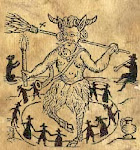
Now, before continuing as to the differences in the book that put it above it's cinematic counterpart, I should warn you, gentle reader, that we are entering SPOILER territory so anyone planning to read the book for themselves might want to skip this post.
Go ahead, I'll give you a minute to skip past me.
Anyway, The Exorcist works even better as a book for the same reason that most long novels turned into films are better than their celluloid counterparts. They possess (no pun intended) an innate edge that I like to compare as being similar to the advantage regular sized candy bars have over the miniature ones. Namely, that while both may be the same great product, one comes with a lot more to sink your teeth into.
For instance, characters like the housekeepers Willie and Karl (would any of you who just saw the movie even know their names?) and detective Kinderman who are little more than bit players in the film all have much more involved roles in the book. Kinderman in particular is given much more to do than awaken Chris to the fact that Reagan killed Burke Dennings, but also deduces this fact for himself and must do a great deal of soul searching as to whether or not to prosecute her for it.
Karl also has an interesting subplot involving his and Willie's daughter who is a heroin addict living in the city. This is something I wish would have found its way into the script because the story's events indirectly lead to the daughter checking herself into rehab and it ties in well with Father Merrin's proclamation that "even from this evil will come some good."
And this brings us to the demon itself and the novel's greatest strength over the film. This is to say that while the film does an excellent job of portraying Pazuzu's (the book leaves no question that this is the possessing entity) vulgar and repulsive attributes such as the swearing and bodily excretions, it fails to ever really display the creature's cunning and that is where the demon's true capacity for terror lies. I'm a big fan of all things horror, to the point where very little actually scares me any more, and while reading this book I was genuinely frightened and not by the head twistings or projectile vomiting but by the sequences like where Father Karras interviews the demon for the first time. In the film this scene is merely an interesting interlude to progress the plot towards the final confrontation. In the book it's an open window into a mind full of so much calculating and malevolent evil that I was actually afraid of it.
But perhaps the most interesting aspect of the novel left out of the film is the relationship between father Merrin and Pazuzu. That's right, relationship. The novel states in no unceartain terms that the demon inhabiting Regan is the same one that Father Merrin faced off against in Africa. This past coonection gives Merrin some added characterization that is missing from the film and also gives the novel's exorcism sequence an edge over its film counterpart because it transforms the clash of wills into a personal one. It is no longer a pair of opposing forces set at odds by allegiance, but a war between individual warriors.
And aside from the above examples, there are also several smaller moments in the book ranging from more detailed descriptions of the church desecrations to an added emphasis on Father Karras' childhood that work to make the literary version of The Exorcist an even fuller story than the film version and a very worthwhile read. And as a final exhibit of both points, I want to leave you all with an abridged excerpt of what is one of my favorite parts in the book that didn't make it into the movie. This is from the "hypnotism" sequence which, in the film, is very short and again only showcases the demon's penchant for vulgarity. Here, it is much longer and leaves you with a taste of what else the demon is capable of:
"I am speaking to the person inside of Reagan now," the psychiatrist said firmly. "If you are there, you too are hypnotized and must answer all my questions."
A Pause.
"Come forward and answer." Silence. Then something curious happened: Regan's breath suddenly turned foul. The psychiatrist smelled it from two feet away. He shone the penlight on Regan's face.
Chris stifled a gasp. Her daughter's features were contorting into a malevolent mask: lips pulling tautly into opposite directions, tumefied tongue lolling wolfish from her mouth.
"Are you the person inside Regan?" the psychiatrist asked.
She nodded.
"Who are you?"
"Nowonmai" she answered gutturally.
"That's your name?"
She nodded.
"You're a man?"
She said, "Say"
"If that's a yes, nod your head."
She nodded.
"Where do you come from?"
"Dog."
"You come from a dog?"
"Dogmorfmocion," Regan replied.
The answer seemed to disquiet him and he lowered his eyes in thought. In the smothering stillness, Regan's breathing rasped as from a rotted, putrid bellows. Here. Yet far. Distantly sinister.

No comments:
Post a Comment